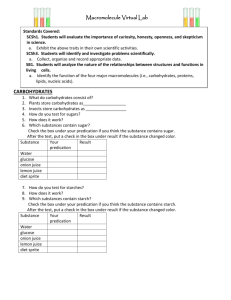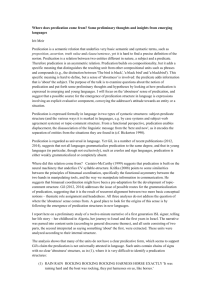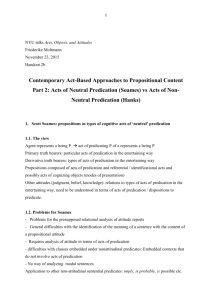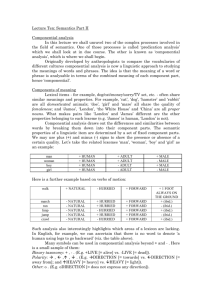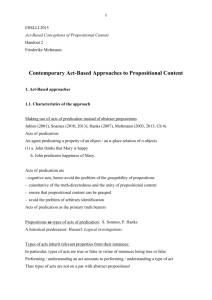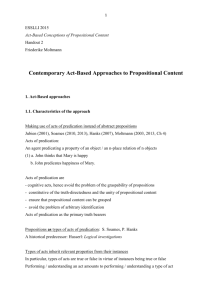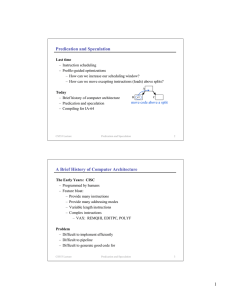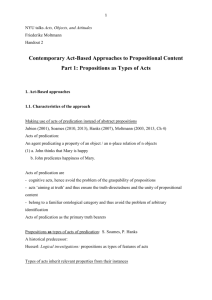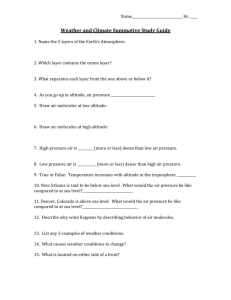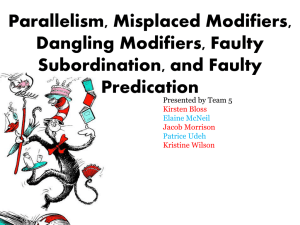Buridan-Index - Fordham University
advertisement
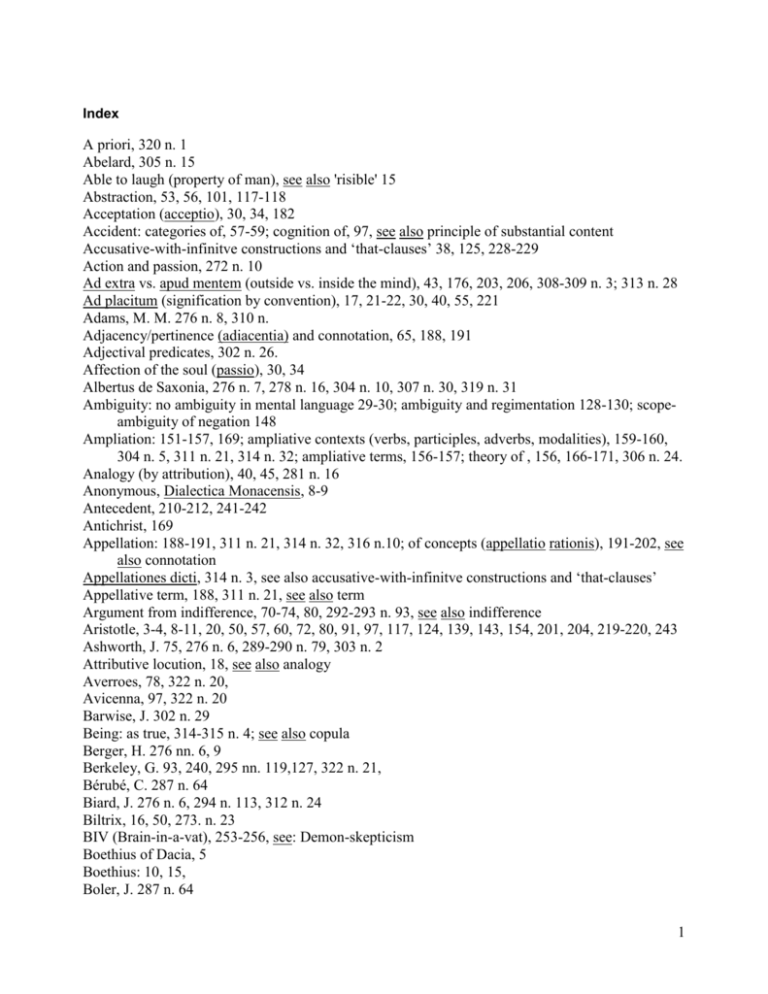
Index A priori, 320 n. 1 Abelard, 305 n. 15 Able to laugh (property of man), see also 'risible' 15 Abstraction, 53, 56, 101, 117-118 Acceptation (acceptio), 30, 34, 182 Accident: categories of, 57-59; cognition of, 97, see also principle of substantial content Accusative-with-infinitve constructions and ‘that-clauses’ 38, 125, 228-229 Action and passion, 272 n. 10 Ad extra vs. apud mentem (outside vs. inside the mind), 43, 176, 203, 206, 308-309 n. 3; 313 n. 28 Ad placitum (signification by convention), 17, 21-22, 30, 40, 55, 221 Adams, M. M. 276 n. 8, 310 n. Adjacency/pertinence (adiacentia) and connotation, 65, 188, 191 Adjectival predicates, 302 n. 26. Affection of the soul (passio), 30, 34 Albertus de Saxonia, 276 n. 7, 278 n. 16, 304 n. 10, 307 n. 30, 319 n. 31 Ambiguity: no ambiguity in mental language 29-30; ambiguity and regimentation 128-130; scopeambiguity of negation 148 Ampliation: 151-157, 169; ampliative contexts (verbs, participles, adverbs, modalities), 159-160, 304 n. 5, 311 n. 21, 314 n. 32; ampliative terms, 156-157; theory of , 156, 166-171, 306 n. 24. Analogy (by attribution), 40, 45, 281 n. 16 Anonymous, Dialectica Monacensis, 8-9 Antecedent, 210-212, 241-242 Antichrist, 169 Appellation: 188-191, 311 n. 21, 314 n. 32, 316 n.10; of concepts (appellatio rationis), 191-202, see also connotation Appellationes dicti, 314 n. 3, see also accusative-with-infinitve constructions and ‘that-clauses’ Appellative term, 188, 311 n. 21, see also term Argument from indifference, 70-74, 80, 292-293 n. 93, see also indifference Aristotle, 3-4, 8-11, 20, 50, 57, 60, 72, 80, 91, 97, 117, 124, 139, 143, 154, 201, 204, 219-220, 243 Ashworth, J. 75, 276 n. 6, 289-290 n. 79, 303 n. 2 Attributive locution, 18, see also analogy Averroes, 78, 322 n. 20, Avicenna, 97, 322 n. 20 Barwise, J. 302 n. 29 Being: as true, 314-315 n. 4; see also copula Berger, H. 276 nn. 6, 9 Berkeley, G. 93, 240, 295 nn. 119,127, 322 n. 21, Bérubé, C. 287 n. 64 Biard, J. 276 n. 6, 294 n. 113, 312 n. 24 Biltrix, 16, 50, 273. n. 23 BIV (Brain-in-a-vat), 253-256, see: Demon-skepticism Boethius of Dacia, 5 Boethius: 10, 15, Boler, J. 287 n. 64 1 Boolean operations, 125, 304 n. 12, 320 n. 2 Bradwardine, T. 227-228, 318 n. 25 Broadie, A. 303 n. 3 Brower, J. 284 n. 43 Brumberg-Chaumont, J. 298-299 n. 160 Burley, W. 198, 313 n. 30 Causes of truth (causae veritatis), 220-221, 31 n. 2 Chalmers, D. 281 n. 24 Chimera, 59 Common sense (sensus communis), 79, 81-82, 96, 100, 237-238 Complexe significabile, 204, 207, 219-225, 272-273 n. 18 Complexio (combination of concepts) 39, 42, 53, 55-56, 123-124 Complexio distans (propositional combination) vs. complexio indistans (non-propositional combination) 55-56 Complexity, semantic vs. syntactic 40-45, 48-50, 52-53, 55, 107, 176 Composition, 53, 280 n. 10 Compositionality, 49-50, 53, 104-108, 176, 308 n. 1, 325 n. 8 Concept: 22, 27-30; absolute vs. connotative (appellative) 56-57, 61, 65-66, 94, 104-106, 112-120; accidental and substantial 92-96; appellation of: see appellation; categorematic vs. syncategorematic 37-38, 55, 105, 175-176, 206, 279 n. 3, n. 5, 282 n. 31, 308-309 n. 3, 320 n. 3, 326 n. 6; combination (complexio) of concepts, see complexio; common (universal) vs. singular 69-83; complexive, 43, 55, 124, 279 n. 5; identity conditions of 30-32; infused, 249; individuation of token concepts 34; quidditative, 108; simple vs. complex, 38-56, 63-65; tokens and types, 34-36; vague singular concepts 108-111; see also intention Concrete, see term Coniunctim (taken together) vs. divisim (taken one by one), 88-89 Connotation, 54-56, 58, 191, 282 n. 3, see also predication: denominative vs. essential/quidditative Connotative, see term, concept Consciousness: 47, 50, 54, 160, 238, 253-254, 298 n. 148 Consequence: 91-92, formal validity of, 210-216; a hypothetical proposition, 243; material, 233, 320 n. 38 Consequent, 210-216 Context: 22, 26, 28, 32, 52, 94-95, 155, 162, 177, 273 n. 19, 306, n. 21; ampliative, 156-159, 166173, 208; intentional and intensional, 134, 156, 187-188, 195, 206, 301 n. 22, 304, n. 5, 311 n. 16, 311 n. 18; of cognition vs. recognition 110-111 Contraposition 211-216 Conventional signification, see ad placitum Conversio ad phantasmata, 277 n. 15 Cooper, R. 302 n. 29 Copula: 38, 43, 45, 55-56, 94-95,122-124, 261-262, 279 nn. 3, 5; 280, n. 10, 281 n. 21, 300 n. 5, 304 n. 10, 308-309 n. 3, 311 n. 17 Copulatim, see supposition, descent Correspondence-condition, 223-226; 229; 231-233 Cosupposition 204, 230-231 Cosupposition condition (CSC) 231-232 Cronin, T. J. 306-307 n. 28 2 D’Ors, A. 271 n. 2 De Morgan’s example (against syllogistic) 139-141 De virtute sermonis (in the proper/strict sense), 17-18; 21 see also ad placitum Definition: 62-66; nominal (definitio exprimens quid nominis), 45, 61-63, 285 n. 47; quidditative (definitio quidditativa), 65-66, 65, 286 n. 54 Definitum, 68 Dekker, D. 308 n. 3 Demon-skepticism, 248, 251-253, 255-258 Demonstration (demonstratio) 10, 13, 66, 154, 236-237, 242-243 DeMorgan, A. 139-141 Denominative vs. quidditative predication, 67, 94, 112, 114, 260, 326 n. 3 DeRijk, L. M. 271 nn. 3-4, 272 nn. 8-9, 304 n. 6, 305 n. 19, 310 n. 9, 312 n. 24, 314 n. 3 Description: nominal definition 68, definite vs. indefinite, 136, 146-148, 150-151, 169 Determination (and determinable), 56-57, 125-127 Dialectic (dialectica), 8, 10, 13 Dictum: 167, 204, 207, 217, 316 n. 12 Difference (essential, specific), 64, 113-118 Distribution, 182; see also supposition, suppositional descent Distributive sign, 182 Dod, B. G. 272 n. 8 Domingo Soto, 284 n. 45, 327 nn. 13-14 Dorp, J. 109-111, 298 nn. 146-147 Duns Scotus, 5, 288 n.67, 306-307 n. 28 Ebbesen, S. 276 n. 6, 303 n. 2 Englebretsen, G. 301 n. 21 Enuntiabilia, 204, 207, 272 n. 10, 316 n. 12; see also complexe significabilia Equivocation, 51-52, 84-86, 121, 153, 276 nn. 6, 8, 290 n. 80 Estimative power (virtus aestimativa) 97 Ex institutione (by convention), see ad placitum Existential import, 136, 141, 143-157, 167, 304 n. 5 Experience, 54, 87, 92-93, 96, 99-101, 110, 118-119, 234-237, 245, 247-249, 264-266 Exponent (exponens), 46 Exposition, 29, 45, 46, 49, 284 n. 45 Fallacy, 182, 241, 310 n. 9 Faral, E. 270 n. 1, 271 n. 5 Frege, G. 131-132, 283 n. 34, 302 n. 25 Gaifman, H. 274 n. 39 Game theoretical semantics, 186-187, 311 n. 14 Geach, P. T. 304 n. 6, 309 n. 6 God (in examples), 25, 42, 57, 59, 69, 71, 84, 113, 115-116, 153, 172, 201, 206, 208, 211, 217, 243-244, 247-248, 252, 281 n. 21, 292 n. 92, 316 nn. 10, 15 Grammarian, 40, 43, 115 Greco, J. 237-239, 245, 321-322 nn. 11-19 Hanoch Ben-Yami, 301 n. 21 Henninger, M. 284 n. 43 Henry of Ghent, 306 n. 28 3 Henry, D. P. 294 n. 111, 304 n. 6, 305 n. 17 Hume, D. 93, 295 n. 119 Hyeronimus Pardo, 182, 308 n. 1, 309 n. 8 Identity theory of predication, see predication Impetus theory, 4 Imposition, 22-23, 46-48, 51-52, 84-85, 89, 117, 176, 221, 290 n. 80, 308 n. 1 In quale: predication in the category of quality, 116; predication in the category of quality as opposed to the predication of specific difference (in quale accidentale vs. essentiale), 112113. Indemonstrable principles of demonstration, 236, 243, see also induction, demonstration Indifference (indifferent representation), 91, see: argument from indifference Induction, 235-237 Inherence theory of predication, 145, see also predication Insolubilia, 216 Intention (intentio, concept), 27, 46, 76, 97, 98, 154, 191, 228-229, 275 n. 1; intentio prima vs. secunda (first vs. second intentions), 228, 319 n. 31; see also concept, ratio Kaplan, D. 317 n. 8 Karger, E. 287 n.65, 317 n. 9, 322 n. 22 King, P. 5, 101, 270 n. 4, 296 n. 132, 296-297 nn. 135-136, 320 n. 38, 326 n. 2 Kneale, W. and Kneale, M. 303 n. 1, 305 n. 15 Knowledge (scientia) 13, 23, 96, 193 Knuuttila, S. 306-307 n. 28 Kripke, S. 294 n. 105 Lagerlund, H. 270 n. 2, 288 n. 67 Lambert of Auxerre 307 n. 30, 310 n. 10 Lambert, K. 162, 306 n. 26, 307 n. 1 Liar paradox, 129, 174, 225-227, 230-233, 301 n. 18, 317 n. 10, 320 n. 37 Locke, J. 93, 295 n. 119, 321 n. 6, Logica: antiqua vs. modernorum, 11-12, docens vs. utens 13-14 Lohr, C. 272 n. 8 Lycan, W. 158-159, 306 n. 27 Marsilius Inghen, 311 n. 18, 312 n. 22 Matthew of Aquasparta, 320-321 n. 4 Meinongian Jungle, 157-159, 162 Mental language, 27-36, 104, 121, 129, 176, 205, 281 n. 24, 299 n. 1 Merrill, D. 303 n. 32 Michael, B. 270 n. 1 Montague, R. 129, 301 n. 19 Moore, W. L. 271 n. 6 Natural science, 243-245, 252, 323 n. 31 Negatio in re, 37 Negation, infinitizing vs. negating (i.e., term-negation vs. propositional negation), 146-147, 167, 170, 186 Nicholas d’Oresme, 71, 108-109, 288 n. 70, 297 n. 144, Nicholas of Autrecourt, 240-243, 294-295 n. 115, 322 n. 22, 323 n. 26 No good inference argument, 239, 324 n. 35 4 Nominal definition (definitio dicens quid nominis), 104, see definition Nominalism, 269 n. 3 Normore, C. 274 n. 39, 282 n. 27, 296 n. 135, 315 n. 6 Nuchelmans, G. 272 n. 18, 283 n. 35, 308 n. 1, 314 n. 3 Numerals and numbers, see numerical quantifiers Numerical quantifiers, 186-187 Numerically one/same or numerically distinct, 15, 17, 28, 29, 34, 276 n. 3, 277 n. 13, 278 n. 16, 288 n. 67 Obligational disputation, 26, 275 n. 43 Odenberg, D. S. 325-326 n. 1 Øhrstrøm, P. 311 n. 17 Ontological commitment, 134, 162-174 Opposition, privative, contradictory or relative, 107 Orenstein, A. 301 n. 21, 303 n. 34 Panaccio, C. 104, 276 n. 9, 281 n. 24, 289 n. 75, 296 nn. 133, 135, 297 nn. 137, 139, 315 n. 8 Parasitic vs. constitutive reference, 76, 291 n. 84 Parsons, T. 301 n. 21, 302 n. 26 Pasnau, R. 287 n. 64, 293 n. 96, 322 n. 20 Paul of Venice 310 n. 9 Per accidens, 97 Per se and primarily (per se et primo), 99 Per se, 66, 97, 100, 109, 114, 116, 160, 236, 264 Perez-Ilzarbe, P. 318 n. 21 Perini Santos, E. 311 n. 17 Perini-Santos, E. 276 n. 9 Pertinence (adiacentia), 188-191 Peter of Spain, 8, 12-13, 306 n. 21 Phantasms, 73, 92, 97 Pini, G. 273 n. 21, 288 n. 67, 324 n. 36 Polish notation, 127 Porphyry, 9, 13, 17, 20, 21, 28, 29, 83-84, 114, 260, 290, 305 n. 17 Predicate: defined, 122, 299 n.2; essential 236 Predication: denominative vs. essential/quidditative, 67, 94, 112-114, 260, 326 n. 3; essential, with connotative terms, 259-263, 287 n. 59; identity vs. inherence theory of, 145; modes of, 94, 152, 260 Priest, G. 306 n. 24, 310 n. 9 Primary substance, 58 Principle of bivalence, 218, 226 Principle of compositionality, 104 Principle of gradation of the certainty of scientific principles, 236, 243-244 Principle of individuation, 73, 80 Principle of natural invariance of mental representation, 32, 248, 253, 256 Principle of noncontradiction, 238-239, 243 Principle of scope-base ordering 127 Principle of the activity of the intellect, 99, 235 Principle of the primacy and multiplicity of scientific principles, 236 5 Principle of the substantial content of sensory information, 99, 235 Privative opposition, 107, 189, 282 n. 30 Pronouns: anaphoric, 302 n. 20; demonstrative, 85, 87, 109-110; relative, 125, 127 Properties of terms, 175-202 Proportion, see analogy of attribution Proposition, 14, 272 n. 18; affirmative has existential import 145, 304 n. 5; atemporal, 214; assertoric (de inesse) 122, 220; categorical, 122-124, 136, 150, 299 n. 3; hypothetical, 122123, 135, 153, 299 n. 3; modal composite vs. divided, 201; quality and quantity of, 135, mental, 16-17, 28-29, 32, 117, 123-125, 205; negative has no existential import, 304 n. 5, self-evident (per se nota; see also indemonstrable principles of demonstration) Propositional nominalization, see dictum Putnam, H. 247, 255, 257, 325 n. 2 Qua, 313 n. 29 Quantification, 133, 136, 138-142, 147, 151-152, 157, 159, 161, 199, 217, 301 n. 20, 302 n. 26; and modes of supposition, 180-186, 309 n. 4, 310 n. 9; and numbers, 186-187; and ontological commitment, 162-174; generalized 137-139, 151, 157, 302 n. 29, 303 n. 30; restricted 134, 137, 149, 303 n. 34, 314 n. 32; many-sorted, 157; uniform 139 Quantifier-shift fallacy, 182 Quid est esse rei (essence), 64, 68 Quid nominis (meaning of the name, nominal definition), 63, 285 n. 47; see also definition Quidditative: definition, 62-65 see also definition; predication. 94-95, see also predication Quine, W. V. O. 163-173, 294 n. 107, 307 nn. 2-4 Ratio, see appellatio rationis Read, S. L. 294 n. 113, 306 n. 24, 308 n. 6, 309 n. 6, 310 nn. 9-11, 318 n. 25, 319 n. 29, 320 n. 36 Reciprocal Liar 25, 216-218 Reid, T. 237-239, 321 n. 11 Relations: in quantification theory vs. Aristotelian logic, 139-142; 303 n. 32 Relative clause: restrictive vs. nonrestrictive, 125-127 Restricted variables, 136-137, 141, 149, 171, 303 n. 33 Rigid designators (see also predication, essential/quidditative), 86, 94, 294 n. 105 Risible (property of man), 15 Sandu, G. 186, 311 n. 14 Schwartz, S. P. 289-290 n. 79 Scientia (knowledge, science), 13-14, 28, 96, 193, 208, 233-252, 320 n.1; division of science 8-9 Scott, T. K. 6-7, 271 n. 7 Searle, J. R. 291-292 n. 84 Second adjacent (secundum adiacens), 'is' as an absolute predicate, 122. See also copula Second intention (intentio secunda), 228-229, 319 n. 31, see also intention Senses: external vs. internal, 81-82, 96-97, 100, 109-111, 118, 298 n. 148 Sensibilia: common vs. proper, 81-82, 100; per se vs. per accidens, 264 Sensus communis (common sense), 79, 96, 100 Siger of Brabant, 5 Signification: ad extra vs. apud mentem (outside vs. in the mind), 203-204, 206, 220; ultimate vs. immediate, 165-166, 175-176; conventional vs. natural, see ad placitum; distinguished from supposition, 165-166, 176-177; modes of, 69, 84-85, 94-95, 117; principal or primary vs. secondary (see also connotation) 6 Significatively (or personally, as opposed to materially), 18, 177, 228 Signs of quantity (signa quantitatis), 148 Singular concepts, see concept Singular terms, see term Spade, P. V. 31, 180, 271 n. 6, 276 n. 8, 281 n. 24, 283 n. 42, 308 n. 1, 309 n. 5 Species, 252 Spruyt, J. 271 n. 2 Square of opposition, 138, 142-145, 152 Subalternation and existential import 156, 304 n. 5 Subordination, see imposition Supposition: 176-180; ampliation of, see ampliation; kinds of, 177-178; modes of, 178-186, see also quantification, quantifier-shift fallacy; natural supposition, 64, 67, 151, 157, 167, 177, 243; and truth, Sweeney, E. 272 n. 7 Syllogism, 139 Syncategoremata, see term, concept Synonymous expressions, not distinguished in mental language, 46-47, 63, 105, 206 Tachau, K. 287 n. 65 Tarski, A. 129, 216, 301 n. 18 Tatarzynski, R. 271 n. 5 Tense, and tempus verbi, 311 n. 20, see ampliation Term (terminus): 175-176, absolute: 61, 67-68, 105, 190, 261-267, can have appellation, 191; cannot have a nominal definition 64, function as rigid designators 94-95; abstract vs. concrete, 57, 115-116, 190; accidental, 58, 94-95, 283 n. 39; appellative, 189-191, appellates its form, 311 n. 21, same as connotative 326 n. 4; categorematic, 37, 56, 58, 60, 69, 106, 176, 203, 207, 261, 279 n. 2; common, 6, 23, 87-89, 109-110, 131-132, 143, 155, 167, 171, 181, 184, 207, 229, 263, 266, 293 n. 98; complex vs. incomplex, 9, 38, 55, 58, 68, 85, 107, 125, 136, 139, 143, 191, 195; collective, 88; conjunctive, 88, 310, n. 10; connotative, 60, 64-68, 94, 103-107, 261-263, 267, 281 n. 24, 282 n. 32, 297 n. 139, 326 n. 4; disjunctive, 179; infinite, see negation; mental, 30, 279 n. 5; oblique, 139, 191, 194; singular, 6, 14-15, 75, 8389, 117, 169, 178, 288 n. 67, 289 n. 79, 291 n. 82, 293 n. 98 Terms of syllogism vs. term of propositions, 140 Theory of evidence, 237-238 Theory of ideas, 239-240 Thijssen, H. 294-295 n. 115 Third adjacent (tertium adiacens), see copula Thom, P. 306-307. n. 28 Thomas Aquinas, 72, 78-79, 81, 288-289 n. 71, 289 n. 72, 293 n. 94, 325 n. 41 Thomas de Vio Cajetan, 325 n. 41 Three operations of the intellect, 39, 280 n. 9 Token-based logic/semantics 14-26, 174, 216, 274 n. 39, 308 n. 10 Tokens & types, 22-36, 177 Truth-conditions, 139, 183, 189, 193, 194, 198, 203-206, 209, 220-221, 310 n. 9 Ungesättigt (unsaturated), 55, 122, 134, 283 n. 34 Universals, 10, 28, 70, 72, 83, 89, 267, 269-270 n. 3, 296 n. 132 Vague individual, 111 7 Van der Lecq, R. 278 n. 1, 316 n. 9 Via antiqua vs. moderna, 6, 58-61, 266-267, 271 n. 6, 283 n. 39, 299 n. 166 Virtual implication condition (VIC) 231 Virtual implication, 227, 230-233, 320 n. 37 Virtus sermonis (force of phrase), 20-21 Westerståhl, D. 303 n. 30 William Ockham, 3, 6-7, 30-32, 70, 90-91, 199, 283 nn. 40-41, 287 n. 66, 305 n. 18, 306 n. 24, 313-314 n. 31, 326 n. 4 William of Sherwood, 305 n. 17 Zupko, J. 269 n. 1, 270 n. 19, 289 n. 72, 293 n. 95, 320 n. 3 8

